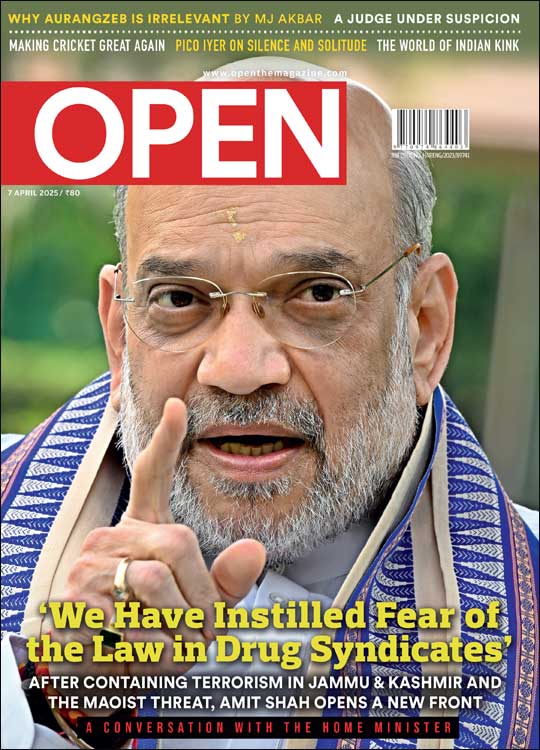Female Qazis: Raising the Bar
India’s pioneering female qazis are pushing for a gender-neutral interpretation of Muslim law
 Lhendup G Bhutia
Lhendup G Bhutia
 Lhendup G Bhutia
Lhendup G Bhutia
 |
27 Apr, 2017
|
27 Apr, 2017
/wp-content/uploads/2017/04/Raisingthebar1.jpg)
IN THE LAST two years that Suraiya Shaikh was preparing herself to become one of India’s first female qazis, she grew close to a young woman in a Muslim neighbourhood in Mumbai’s Khar suburb. Shaikh is a member of the Bharatiya Muslim Mahila Andolan (BMMA), an advocacy group that campaigns for female rights within the community. She came to know the woman—let’s call her Haseena, a teenager then and now 20 years old—through an outreach programme of the group.
Haseena was going through a particularly bad time. She was only just beginning to heal from a severe bout of tuberculosis, which had forced her to discontinue her school education. She spent all her time indoors, her body was getting frailer by the day, and the strong medicines she consumed had left her deaf in one ear. According to Shaikh, who used to visit Haseena at home, the young girl was also in depression.
During these visits, Haseena would convey her anxieties and fears. And Shaikh, in return, would tell Haseena about her life, and her ambition of becoming a qazi, an Islamic judge. The two Muslim women, separated by exactly 25 years in age, were to become close friends.
Several days went by last year without the two getting a chance to meet. But when Haseena suddenly appeared in front of Shaikh next, she had undergone a striking transformation. She looked healthy and had put on some weight. When she would comb her hair, Suraiya says, she would take almost two hours to do just that. But the most remarkable thing about her, Shaikh recalls, was Haseena’s new-found ebullience.
“It was love,” Shaikh now says. “She was in love.”
Haseena had fallen in love, gotten engaged, and was planning to get married by end of 2017. But this marriage, as Shaikh now laughs while recounting the story, is not going to be like any old love marriage. It is neither a simple love marriage, she says, nor an arranged one. “It will be a wrong-number love marriage.”
A young Muslim man in Malad had mis-dialled a phone number and found himself accidentally speaking with Haseena. Drawn by the quality of each other’s voice, the frequency of these ‘wrong number’ calls increased over the next few months until the two were sure they were in love and decided to get engaged.
Haseena has now put a condition to her suitor. When the two get married in December, their wedding will have to be conducted not by a qazi chosen by his family, as has come to be the tradition, but by a female one, Suraiya Shaikh.
“The boy’s family has so far not agreed to the idea of a female qazi. I believe they are saying this is not possible. But the boy has promised he will convince them,” Shaikh says. “And maybe this will be my first nikaah.”
Some days ago, when Haseena learnt that Shaikh had completed her training, she wanted to know when the qazi would need to be intimated for a December wedding. “I told her, ‘Usually you have to register a month in advance, but you had better register by October’,” Shaikh recounts. “These wrong number marriages, I don’t know… Kuchh tehkeekat karna padega (We will have to carry out some investigations).”
The BMMA, which was formed in 2007, although its members have been campaigning for Muslim women’s rights for much longer, pursues its cause in different ways. It files petitions in court, like the one that resulted in women being allowed to enter the sanctum sanctorum of Mumbai’s Haji Ali dargah. It also runs a legal aid centre in Mumbai, Shariah Adalat, for aggrieved Muslim women, which often pits them against qazis and maulanas who interpret Muslim laws unfavourably towards women.
“It’s really atrocious how these qazis go about their job,” says Khatoon Shaikh, the BMMA’s Maharashtra convenor. “Often, they don’t even have proper training. They just grow long beards and open their shops,” adds Heena Siddiqui, a BMMA member. As the women describe it, Islamic judges have several duties to perform, like ensuring that there is no underage marriage, that a wedding has the consent of both the bride and groom, and later, if the husband wants to divorce his wife, the procedure is spaced out over a proper period of time (with a reconciliation attempt), and not done by the man saying one word thrice at a single go. “But the problem with these qazis,… is that a husband will say ‘talaq’ thrice and a male qazi will just listen to the husband’s version of things and finalise a talaqnama, without once listening to the woman or asking witnesses,” Khatoon Shaikh says.
WHEN BMMA MEMBERS learn of such cases, they not only meet both parties and try to reconcile the matter, but also catch hold of the offending qazis. They send notices to them and, if needed, file police complaints. Sometimes the qazis apologise and promise to rectify issues. Sometimes they switch off their phones and refuse to meet them. In one such case some years ago, they began receiving complaints about a Bandra judge known as Musa Qazi who had solemnised marriages where the bride was a minor and finalised divorces without once meeting the wife. “We just went to his office, all of us, and really scared him,” says Siddiqui, “Now he doesn’t do anything like that. In fact, when we need a qazi, we send our people to him now.”
A husband will say talaq thrice and a male qazi will listen to his version and finalise a talaqnama without once listening to the woman
In most cases, however, such relatively easy resolutions aren’t available, and Muslim women languish under unfair rulings as a result. Two years ago, the BMMA released the findings of a two-year-long survey it had conducted among 5,000 Muslim women in 10 Indian states. A majority of the women turned out to be housewives who had been married before the age of 18 and who suffered from domestic abuse. Many of them were divorcees. The survey revealed that most of them wanted the Triple Talaq process of divorce to be abolished, arbitration before a divorce to be made compulsory, and any qazi who gave legitimacy to such a divorce without consulting the woman or stipulating the need for arbitration to be punished.
About three years ago, as the results of the survey began to come in and several cases presented themselves at their Sharia Adalat, members of the BMMA began to wonder: why should they only deploy their methods for fire-fighting? Why couldn’t they attempt to prevent these fires in advance? Noorjehan Safia Niaz, one of the co-founders of the group, was more specific. Why didn’t the group train women to be qazis?
The group set up a centre for Islamic learning and theology, Darul Uloom Niswaan, and prepared a syllabus covering various subjects ranging from the Indian Constitution and jurisprudence to Muslim prayers and laws, as also the history, principles and values of Islam. A total of 30 Muslim women across India were selected to join the training programme. Two years later, 15 of them have qualified as Islamic judges. There have never been women holding these positions in India before, barring a few exceptions like Shabana Ara Begum, whose father, a qazi in West Bengal, helped her become one several years ago. Niaz says she hasn’t come across any such cases elsewhere either in the larger Islamic world. Several of them have been taunted by traditionalists who claim that females cannot be judges. But the BMMA points out that the Qur’an does not bar women from the role. “The problem is not that the Qur’an is unfair towards women. It is the misinterpretation done by qazis and clerics,” Siddiqui says. “A female qazi, we think, will bring a more gender-neutral perspective when she interprets Islamic laws. She will think about the woman before deciding any matter.”
Siddiqui recounts a case she encountered a few years ago, where a husband divorced his newly-wed wife by uttering talaq thrice upon discovering that she wore glasses. “When the family had come to see her before marriage, she hadn’t been wearing the spectacles. But after the marriage, when they found that her eyesight was weak, they claimed they had been cheated,” Siddiqui says. “And can you believe it? The qazi confirmed this talaq without once meeting the girl.”
Safia Akhtar, a 65-year-old former college professor in Bhopal who has also qualified as a qazi, narrates a problem-case she is currently helping resolve. A woman wants to divorce her husband because he has taken another wife. But whichever qazi she has approached so far has forbidden her from divorcing her husband. “We are now fighting the case in court,” says Akhtar.
Among other things, women judges will ensure that for weddings, the address and identity documents of grooms as well as brides are submitted for scrutiny; that sources of income are ascertained; and that both are marrying of their own free will. “These are small basic things, but often no one does them,” Siddiqui says.
We sit on the floor in a tiny two room office in Bandra’s Kherwadi area. There is little here other than wooden stools upon which rest large registers detailing the cases of several women. The walls are covered with colourful posters of messages. ‘Jahaan insaaf nahin, wahan Islam nahin’ says one; where there is no justice, there is no Islam. Another has details of cases dealt with last year: a total of 229, of which a majority concerned Triple Talaq (31) and polygamy (35); the BMMA has managed to resolve 61 of them, a success rate of 38 per cent.
Below these charts, Nirmala, a Hindu woman who volunteers at the organisation, sits with a large register. “Fifty-four new cases already this year, can you believe it?” she asks and raises her arms.
Beside her, seated on the floor are three women. One of them, draped in a burkha, draws open her facial veil to reveal a face not older than 25, perhaps even younger. “She is almost four months pregnant,” says one of her two companions. “But her husband refuses to cooperate.” The woman’s face has no expression and her eyes seem vaguely focused on the thickness of the register.
The young woman, it turns out, was married six months ago to a Muslim man in a Jogeshwari household in the city. But she had to return home just a few months later after she was verbally and physically abused by her in-laws. She wants a divorce, but her husband has refused to grant one. Her doctors have now found that her foetus has an abnormality, a danger to her as well as the foetus if she goes ahead with the pregnancy, but the husband refuses to sign any document permitting an abortion. He was supposed to visit the office today to discuss the issue, but almost an hour later, he has not shown up.
Suraiya Shaikh’s face tightens with rage when the husband says over phone that he can’t come. She threatens to lodge a non- cognisable offence against him if he doesn’t show up in two days. The young woman gazes at the register throughout the conversation. The doctors want to abort the foetus by next week; an abortion after 20 weeks of pregnancy would be illegal. The three thank Shaikh and promise to return a few days later.
All of Saturday passes like this. A few people come with new cases or to inquire after old ones. The weekdays are much busier, where the entire room is crowded with people and their grievances. Khatoon Shaikh is away today, at a police station in Bhiwandi, where a Muslim man has kept both his children but thrown his wife out of his house on the suspicion that she is having an affair with someone. And when there is no one around, Suraiya Shaikh, Siddiqui and Nirmala joke amongst themselves.
The biggest challenge for them, they admit, will be to be accepted as qazis. “We have done all this,” Niaz says. “Now I think the community should come forward and respond.” But the qazis themselves don’t plan on waiting. Several of them have begun to contact their family members and friends to see if there is anyone of marriageable age whose weddings they can formalise.
SURAIYA SHAIKH HAD JOINED the BMMA after the group helped resolve a marital discord between her sister and her husband. Over the years, she has encountered so many cases, from Facebook Triple Talaq posts to divorce notices sent by email and SMS, that she is no longer surprised by them. She has also learnt to keep her temper in check.
But occasionally, anger gets the better of her. Some days ago, while walking out of Bandra Railway Station with her daughter- in-law, she caught sight of a man hitting his wife. She intervened to help the woman hit her husband back. Her daughter-in-law, who is quite conservative and has been suspicious of her mother- in-law’s activism, was shocked. “How could you do that?” she asked Suraiya Shaikh. “You are a qazi now.”
About The Author
CURRENT ISSUE
‘We Have Instilled Fear of the Law in Drug Syndicates,’ says Amit Shah
MOst Popular
4

/wp-content/uploads/2025/03/Cover_Amit-Shah.jpg)













More Columns
Why CSK Fans Are Angry With ‘Thala’ Dhoni Short Post
What’s Wrong With Brazil? Sudeep Paul
A Freebie With Limitations Madhavankutty Pillai